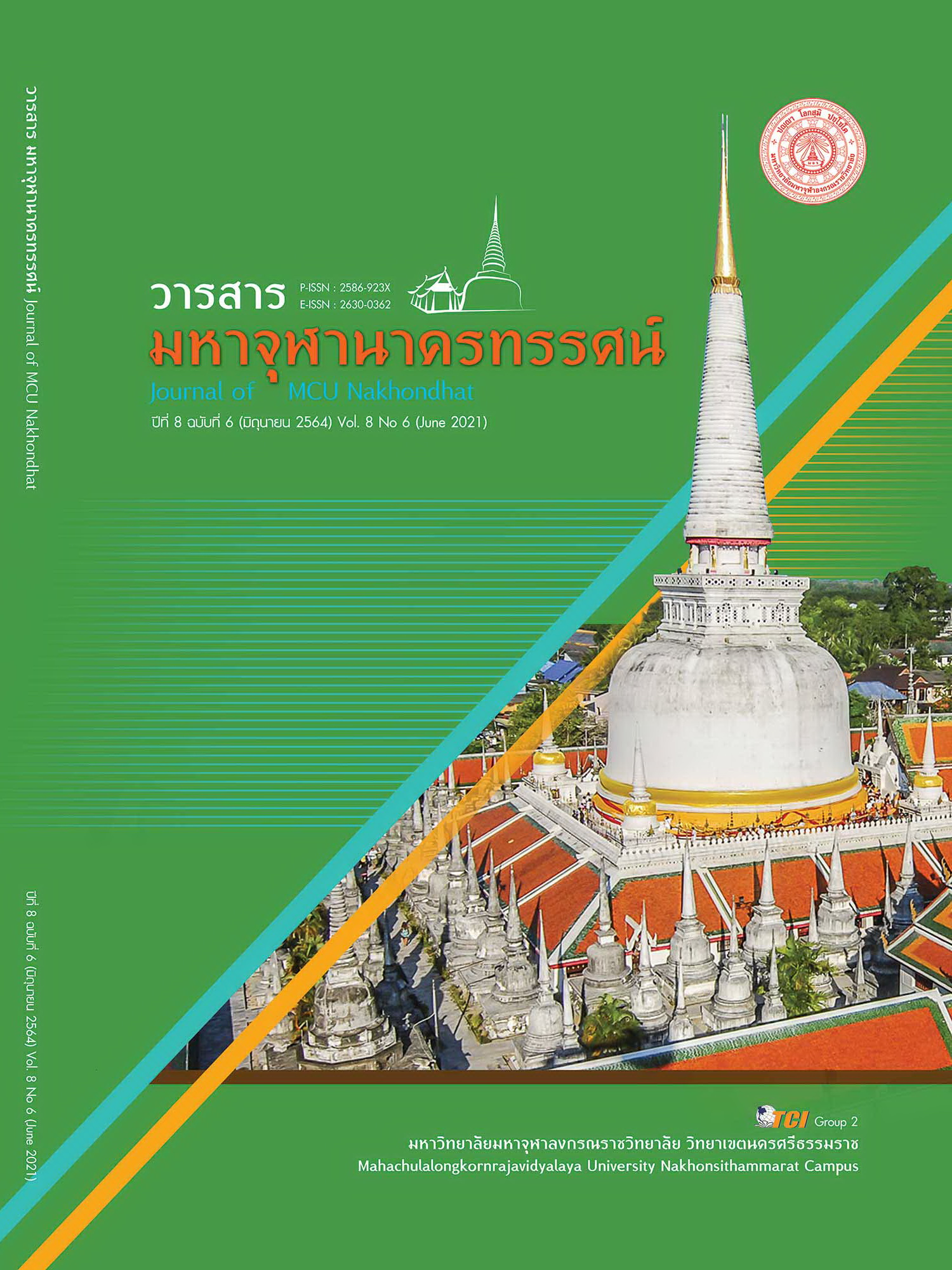A LEARNING MANAGEMENT MODEL OF SCIENTIFIC RESEARCH ETHICS TO ENHANCE UNDERGRADUATE STUDENTS' MORAL, ETHIC, AND LIFE AND PROFESSIONAL SKILLS
Main Article Content
Abstract
The objectives of this article are to create a teaching model of research ethics by using active learning and to develop research ethic learning outcome and enhance life and professional skills in an aspect of moral and ethics of undergraduate students in Culinary Technology and Service Program, Suan Dusit University. The students were given an opportunity to freely participate in active learning activities. The research instruments were the experiment instrument which consists of various types of active learning activities including videos, guest lecturers and a case study. The data collecting instruments which consist of research ethics evaluation form and life and professional skills evaluation form. Consequently, the data was analyzed by mean, standard deviation, independent samples t-test, as well as Pearson product moment correlation coefficient. The research findings revealed that the research moral and ethics of the students who participated in active learning activities are higher than the un-participated one. The analysis of life and professional skills revealed that the participated group have higher score than un-participated group. The research moral and ethics of the students who participated in active learning activities are not different from un-participated in active learning activities. The life and professional skills of the students who participated in active learning activities are significantly different from un-participated in active learning activities revealed that the participated group at .05. The relationship between research ethics and life and professional skill were not related
Article Details
References
ทิศนา แขมมณี. (2560). ศาสตร์การสอน: องค์ความรู้เพื่อการจัดกระบวนการเรียนรู้ ที่มีประสิทธิภาพ. กรุงเทพมหานคร: สำนักพิมพ์แห่งจุฬาลงกรณ์มหาวิทยาลัย.
ธัญธัช วิภัติภูมิประเทศ. (2557). ความตระหนักในจริยธรรมการวิจัยของนักศึกษาระดับบัณฑิตศึกษา. วารสารศึกษาศาสตร์ มหาวิทยาลัยนเรศวร, 16(4), 46-54.
พิมพันธ์ เดชะคุปต์ และพเยาว์ ยินดีสุข. (2558). การจัดการเรียนรู้ในศตวรรษที่ 21. กรุงเทพมหานคร: โรงพิมพ์แห่งจุฬาลงกรณ์มหาวิทยาลัย.
พิษณุ อภิสมาจารย์โยธิน และปรีชา สุนทรานันท์. (2557). การพัฒนาจิต คุณธรรม และจริยธรรมของนักศึกษาแพทย์ศิริราช. วารสารวิชาการเฉลิมกาญจนา, 1(2), 55-66.
รุ่งนภา ตั้งจิตรเจริญกุล และคณะ. (2560). การศึกษาแนวทางการปลูกฝังคุณธรรมจริยธรรม ที่พึงประสงค์ของนักศึกษาระดับอุดมศึกษาไทย. วารสารพฤติกรรมศาสตร์, 23(1), 147-168.
วัชรา เล่าเรียนดี และคณะ. (2560). กลยุทธ์การจัดการเรียนรู้เชิงรุก เพื่อพัฒนาการคิดและยกระดับคุณภาพการศึกษาสำหรับศตวรรษที่ 21. นครปฐม: เพชรเกษมพริ้นติ้ง กรุ๊ป จำกัด.
ศานิตย์ ศรีคุณ. (2560). การตรวจสอบความตรงเชิงทฤษฎีของแบบวัดจริยธรรมในกระบวนการวิจัย. วารสารศึกษาศาสตร์ มหาวิทยาลัยขอนแก่น, 40(4), 47-57.
สถาพร พฤฑฒิกุล. (2555). คุณภาพผู้เรียน เกิดจากกระบวกนการเรียนรู้. วารสารบริหารการศึกษา มหาวิทยาลัยบูรพา, 6(2), 6(2), 1-13.
สมศักดิ์ อมรสิริพงศ์ และภัทร์ พลอยแหวน. (2559). การพัฒนาการเรียนรู้ด้านจริยธรรม การวิจัยในงานวิจัยเชิงคุณภาพของนักศึกษาปริญญาเอก หลักสูตรรัฐประศาสนศาสตรดุษฎีบัณฑิต คณะสังคมศาสตร์และมนุษยศาสตร์ มหาวิทยาลัยมหิดล. วารสารปัญญาภิวัฒน์, 8(1), 150-162.
สิทธิพร ประวัติรุ่งเรือง. ((มปป.)). การพัฒนาอาจารย์ให้สอนแบบ Active Learning ของมหาวิทยาลัยนอร์ทกรุงเทพ. เรียกใช้เมื่อ 1 พฤษภาคม 2562 จาก http://www.mua.go.th/users/he-commission/t-visit%20project/t-visit%20 book%202/15--g2--8-1.pdf
Eisen, A. et al. . (2004). A Model for Teaching Research Ethics. Science and Engineering Ethics, 10(4), 693-704.
Hazzan, O. et al. (2011). Guide to Teaching Computer Science: An Activity-Based Approach. London: Springer Publishing Company, Incorporated.
Tolich, M. et al. (2017). Teaching Research Ethics as Active Learning: Reading Venkatesh and Goffan as Curriculum Resources. Retrieved May 1, 2562, from https://www.tandfonline.com/doi/abs/10.1080/13645579. 2017.1287870


